When I came to live in the Clydach valley, I came to understand the nature of plants in a different way: that they all have a reason for their arrival and presence, and something to teach us. The original, round gardens at Brithdir Mawr were made from deep bracken mulch. That supressed the weeds, and fertilized the ground as it rotted down.
Cutting it from the fields, helped diminish it's dominance in the pasture.
Above us are the slopes of Carningli Common, which has an increasing cover of bracken.
This is the result of insufficient grazing by cattle, who are the principle crushers of it: sheep and horses will pick their way nimbly through it.
Also, sporadic burnings of the dead bracken litter in the Spring, have benefitted rather than hampered it's spread and vigour, as it's roots are too deep to be affected by such primitive responses, while competing herbiage is destroyed.
Amongst the more entrenched bracken, saplings appear, protected from grazing by a bracken wall. The most successful are Rowan and Birch, both I suspect because they are supple, and can be bent down by the bracken's autumn collapse without losing heart.(a lesson perhaps in not being too rigid).
So bracken can be seen as a restorative plant: providing humus to impoverished earth, and cover for trees. Grassland forms too impenetrable a mat for many trees to establish in.
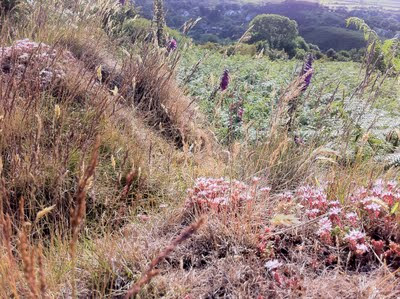
There is another way bracken, in common with other 'invasive' plants, can benefit us and our dialogue with the Earth. It offers us an opportunity to make a social occasion of cutting it from key places, so celebrating common cause, and recognising often neglected places.
A gang of people armed with scythes and a picnic can effect great change.
Grassland is a specialised state of being, achieved by the continual chomping and trampling of an army of grazers (grass-ers),all of whom favour different herbiage.
Trees and bushes with prickly or crunchy leaves take any opportunity they can to walk out into it. Holly is only prickly, beech & oak only hold their dried up leaves, below the reach of browsing cattle.
Bracken is Earth's healing mantle that she casts over uncared for pastures and sheep-walks.
When I bought Allt Tabor, it was clothed in a thick layer of bracken, with patches of gorse, and occasional hawthorns, blackthorns and sycamores. That is, apart for one magnificent spread branched ash tree, Bless her.
The place is best described as a rocky hill, but with hollows and ledges. Near the ash tree is a large flat ledge, that I saw asy future garden.
My first act was to get a local diggerman to open up a gap in the bank above so that I could park my van. Having done that, he smooth scraped the bracken from the garden site. I don't recall asking him to do that, but it has been tranformative. It didn't hold the bracken back for long, but the great heap of waste that he had scraped, became a heap of rich, dark compost.
This had been the core source of soil for my garden.
Over the first two years of having the land, I ignored the idea of a garden, and tried to establish scattered clumps of trees on the main body of the hill.
Many succumbed to smothering by bracken. I was engrossed in other things and didn't flatten around them enough.
Where I had cut the mat of bracken though, it was smaller, and wiry grasses and bramble had crept in. So timely intervention was noticeably effective.
When you don't want it anymore, it will leave.
I heard about a farm where every field has been covered by it.
The new owners cut it three times a year, for three years, and it was gone.
I have no intention of getting rid of all, or even most of mine. A great tribe of snakes live there, and love it's cover. A friend pointed out to me that the adders' patterning echoes it.
I see it as a gift, mostly, that I will harvest into heaps, and carry the eventual compost to Favoured plants and trees nearby.
In the garden though, I find it hard work.
Last year I felt it was time to start.
Gardening has become an increasingly irrepressible instinct for many people.
A bit like that chap who took on the project to build an enormous floating zoo maybe..
I went halves on a large roll of plastic groundcover and rolled some of my bit out double over 20 feet of cut bracken, weighing it down well.
A month later, I rolled it back and spread a good layer of bracken compost before resetting the cover. I then cut holes every twenty inches in that, and nestled seed potatoes in each one.
The resulting crop was meagre, but full of life. Being bedded in bracken, the potatoes were unblemished.
This year I decided to Garden properly. I tripled the area under ground cover. Bracken though is vigorous and persistent. It pushes up even in low light and that stretches the cover to let more light in.
I underestimated it's resources, regarding the ground broken by last years potatoes as only needing another feed of compost to be mixed in before I planted my onion sets and shallots.
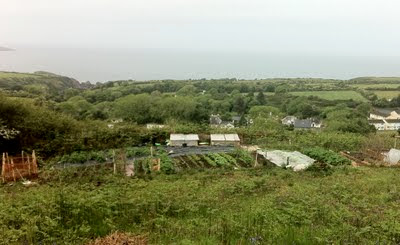
I read avidly and planted as early as I dared. My most consistent guide has been Allotment Month by Month, by Alan Buckingham .
As I extended the garden, planting my broad beans, and later a row of early potatoes, I found myself looking back on a sea of bluebell tufts and bracken fronds pushing up amongst my onions.
I started to mattock the ground more deeply and came upon a dark kingdom of dead- looking fibrous tubers like an ancient sewerage system, laced thickly together, a foot down.
Like little pearls, bluebell bulbs nestled in their entanglement. Beauty consorting with the Beast.
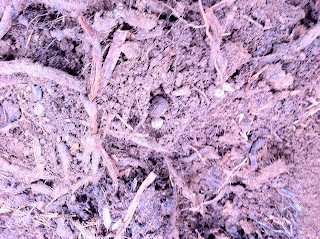
Preparing new ground became an epic burst of effort. It was hard to remain systematic but the most effective way was to dig out a trench to claw the next spit of soil into. Even so, bluebell bulbs are tiny (thankfully they are bright white) and bracken tuber looks innocently dead, so both are easy to miss.
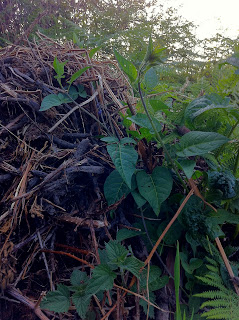
My recent tactic is to install raised beds. When I have cleared the soil, I lay cardboard below before refilling the bed.
I much prefer to grow plants in clumps rather than lines anyway, so this feels like progress.

I love bracken more now. I admire it's strategies, persistence and vigour.
I scythe the bracken around and pile it on the compost heap.
Foxgloves and campion and grasses are returning as it's hold weakens.
If I desist, it will return.
It is a gift.
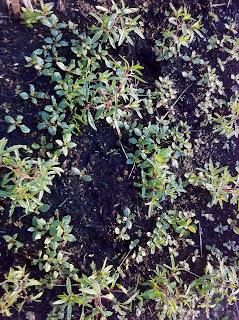
Not sure about those princess courtesans,
the bluebells though...
